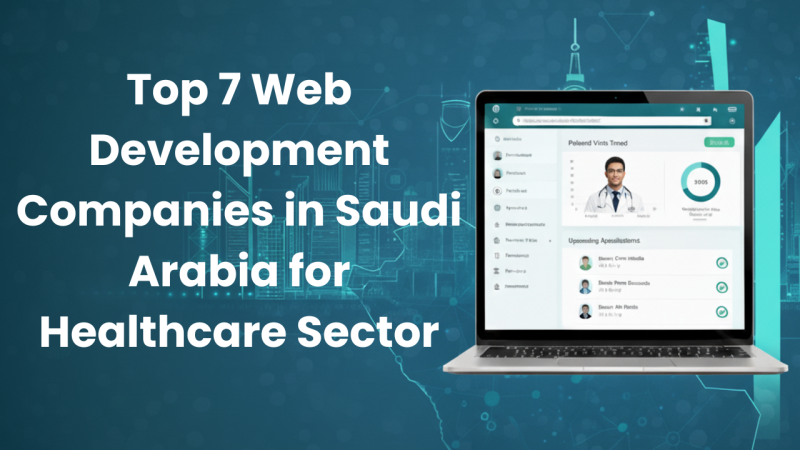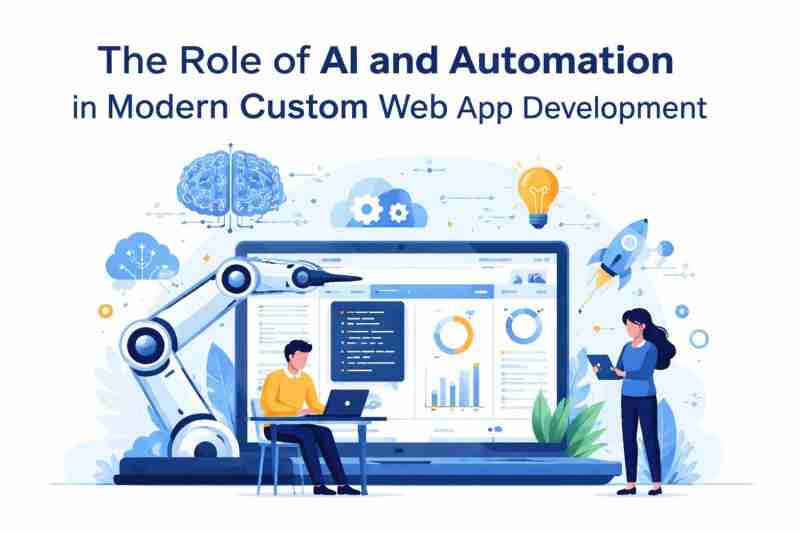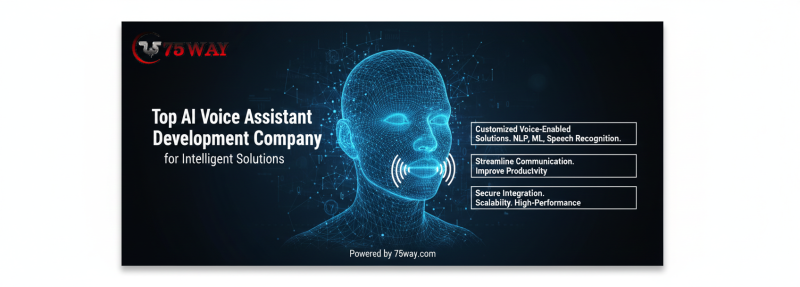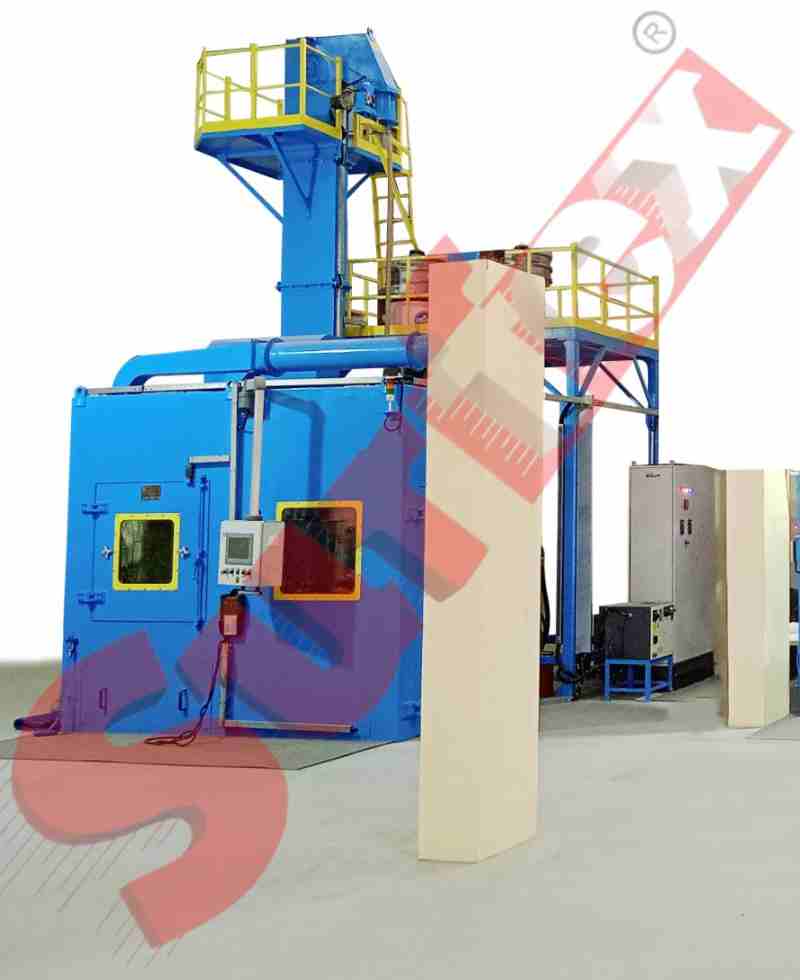Technology
Top 7 Web Development Companies in Saudi Arabia for Healthcare Sector

Introduction
Digital transformation in healthcare is rapidly gaining momentum in the Kingdom, driven by increasing patient demand for online services, government e-health initiatives, and growing adoption of telemedicine. As hospitals, clinics, labs, and medical startups move toward technology-enabled care, the need for web development in Saudi Arabia has grown significantly. Healthcare providers are no longer just looking for simple websites; they need advanced platforms that support secure patient data access, online consultations, appointment scheduling, e-prescriptions, and integrated medical systems.
In addition to government initiatives, private hospitals and medical groups are increasingly partnering with Web Development Companies in Saudi Arabia for Healthcare Sector to build advanced digital systems. These platforms enhance patient engagement, streamline clinical workflows, and enable features like AI-driven diagnostics, cloud-based medical records, and smart hospital management programs. By leveraging expert web development, healthcare providers are moving toward fully connected care ecosystems, creating more efficient, secure, and patient-friendly services.
Overview of Saudi Arabia’s Digital Healthcare Transformation
Saudi Arabia is actively building one of the most advanced digital healthcare systems in the Middle East. The government has launched a series of nationwide platforms — including virtual hospitals, centralized appointment systems, electronic health records, and e-prescription networks — to improve healthcare accessibility and transparency. These developments are reshaping the way patients interact with doctors and healthcare facilities, offering more convenience and faster access to essential services.
In addition to government initiatives, private hospitals and medical groups are investing in web development in Saudi Arabia to create digital systems that enhance patient engagement and streamline internal workflows. From AI-driven diagnostics to cloud-based medical records and smart hospital programs, healthcare providers are moving toward fully connected care ecosystems. This ongoing innovation has created a strong demand for highly skilled technology partners who understand both healthcare needs and advanced digital capabilities.
The Growing Demand for Specialized Web Development in Healthcare
Healthcare platforms must go beyond standard web features. They need secure data systems, intuitive interfaces, and support for real-time communication between patients and medical staff. Many healthcare facilities in Saudi Arabia are therefore seeking development companies with expertise in medical technology — teams capable of building virtual consultation platforms, online prescription systems, doctor dashboards, insurance integration modules, and electronic medical record systems.
These platforms must also support rigorous operational requirements, including secure cloud data storage, continuous uptime, and reliable performance during peak usage. The complexity of medical workflows and the sensitivity of patient data make it essential for developers to understand clinical environments and compliance standards. As a result, demand for healthcare-focused development experts continues to rise across the Kingdom.
Why Healthcare Web Development Matters
Importance of User-Friendly Patient Portals and Telemedicine Platforms
Digital healthcare platforms play a central role in the patient journey today. Patients expect instant access to appointments, medical history, lab results, prescriptions, and online consultations. A well-designed patient portal makes healthcare more accessible and convenient, helping patients manage treatments, track recovery progress, and stay connected with doctors from any location. Telemedicine platforms have also become vital, particularly in remote areas, offering timely care without the need for physical visits.
Ensuring Data Security and Compliance with Healthcare Regulations
Because medical platforms manage sensitive patient records and confidential health information, security is a top priority. Healthcare organizations must ensure strong data protection measures, encrypted communication, secure login systems, and compliance with Saudi health data laws and international security frameworks. Any breach can undermine trust, disrupt medical services, and result in severe penalties, making regulatory-compliant development essential for healthcare providers.
Enhancing Accessibility and User Experience in Arabic and English
The Kingdom serves a multilingual population, and digital healthcare platforms must cater to both Arabic- and English-speaking users. Culturally sensitive interface design, support for right-to-left text formatting, and easy navigation are key to ensuring accessibility for all patients. Many users rely on mobile devices for accessing medical services, so responsive, mobile-optimized platforms are essential for offering a smooth digital care experience across all demographics.
Role of Web Development in Saudi Arabia in Healthcare Excellence
Local expertise has become a major advantage for healthcare providers looking to build modern web systems. Companies specializing in web development in Saudi Arabia understand local healthcare regulations, bilingual design needs, and Saudi user preferences. They can build platforms that align with national digital health policies and provide reliable support to medical facilities across the country. Their ability to combine security, user experience, and medical functionality positions them as essential partners in Saudi Arabia’s healthcare digitalization journey.
Key Factors to Consider When Choosing a Healthcare Web Developer
Selecting the right partner for healthcare web development requires far more than reviewing design portfolios or checking pricing. Healthcare systems operate in a sensitive and highly regulated environment, which means your development partner must combine technical capability with deep sector understanding. The right company should be able to build platforms that support medical workflows, maintain data integrity, enable secure patient–doctor interactions, and scale with future healthcare innovation in the Kingdom.
Experience in the Healthcare Domain
Healthcare is a specialized field, and developers must understand how hospitals, clinics, and medical platforms operate. A skilled healthcare developer is familiar with patient management systems, appointment workflows, teleconsultation needs, e-prescription modules, digital health records, and insurance processes. Experience in handling medical tech projects ensures better planning, smarter UI/UX thinking, and fewer operational challenges once the platform is live. Organizations should always review past healthcare projects, client testimonials, and case studies to ensure their chosen team has practical knowledge of building systems for real medical environments — not just general-purpose websites.
Digitize patient care with telehealth, patient portals, and secure medical platforms.📞 Book a live demo with our healthcare tech expertsTechnical Expertise in Modern Healthcare Technologies
Healthcare platforms are evolving beyond websites — they are becoming connected, data-driven digital ecosystems. Developers must be skilled in advanced technologies such as artificial intelligence, cloud infrastructure, IoT-enabled medical devices, secure databases, and automated reporting systems. For example, AI may be used for patient triage or appointment prioritization, while cloud systems ensure medical data is securely stored and accessible across hospitals and remote clinics. Strong API integration ability is equally important, as medical systems must connect with insurance networks, pharmacy services, lab software, and national e-health platforms. A technically capable development partner ensures your healthcare solution remains future-ready and adaptable to upcoming technology waves.
Security and Regulatory Compliance
In healthcare, trust is everything — and that trust depends on secure and compliant platforms. Medical data is highly sensitive, and even a minor breach can affect patient safety and result in legal consequences. Your technology partner must understand Saudi healthcare data guidelines, global standards such as HIPAA, and other privacy and cybersecurity frameworks. They should be able to implement secure authentication, encrypted communication, role-based access control, and continuous monitoring systems. Compliance-ready platforms protect patient confidentiality, strengthen institutional credibility, and ensure smooth integration with national digital health regulations and systems.
Post-Launch Support and Scalability
Healthcare platforms must operate 24/7, and downtime or technical glitches can disrupt care. A reliable developer should offer strong post-launch support, performance monitoring, and ongoing enhancement services. As healthcare operations grow — with new clinics, more patients, or added medical services — the web system must scale smoothly without slowing down or compromising security. Choosing a partner capable of long-term support, upgrades, and scalability ensures your healthcare solution continues to evolve alongside medical needs and digital advancements in the region.
Top 7 Web Development Companies in Saudi Arabia for the Healthcare Sector
1. Apptunix
Apptunix is a prominent healthcare web and app development firm that builds end-to-end digital systems for hospitals, clinics, and telemedicine providers. Their teams combine healthcare domain knowledge with modern engineering to deliver secure patient portals, EHR integrations, appointment ecosystems, and AI-enabled features. Apptunix emphasizes compliance, Arabic/English UX, and scalable cloud architectures so medical organisations can launch and expand digital services reliably. They are often chosen for projects that require both clinical workflow understanding and production-grade engineering.
Expertise
- HIPAA-grade encryption and secure data handling
- Patient portals, EHR/EMR integrations, and doctor dashboards
- Telemedicine platforms (video, chat, scheduling)
- AI modules for triage, appointment prioritisation, and analytics
- Arabic/English bilingual UI with RTL support
Apptunix also provides continuous monitoring, SLA-based support, and iterative feature roadmaps to keep platforms secure and up-to-date.
2. QuickWorks
QuickWorks focuses on fast, cost-effective healthcare web solutions tailored to clinics and small hospitals. They excel at turning concise requirements into production-ready patient management systems, online booking portals, and lightweight teleconsultation services. QuickWorks balances speed with stability, making it a practical option when time-to-market is important but security and usability cannot be compromised.
Expertise
- Rapid-deployment patient management systems
- Appointment scheduling engines and reminders
- Secure messaging between patients and clinicians
- Lightweight EMR modules and admin dashboards
- Mobile-responsive web apps and bilingual support
For healthcare providers piloting digital services or expanding to online bookings quickly, QuickWorks offers practical packages and post-launch tweaks.
3. Blocktunix
Blocktunix builds healthcare platforms that emphasise advanced security and future-ready features, such as blockchain-backed record verification and AI-driven workflows. Their work suits organisations that need enhanced data integrity, auditability, and automated payment/consent flows. While more innovation-focused, Blocktunix still implements the core patient-facing functionality required for everyday healthcare operations.
Expertise
- Blockchain-enabled medical record immutability and consent tracking
- Smart contracts for secure payments and insurance workflows
- AI-assisted decision support and data analytics
- Secure identity verification and decentralized access control
- Integration with existing hospital systems and APIs
Blocktunix is recommended when you want to add verifiable audit trails or experiment with decentralized trust layers alongside standard telehealth features.
4. UAE-Based Healthcare Developers
Several experienced UAE development teams are available to serve Saudi healthcare clients, bringing cross-GCC experience, regulatory familiarity, and bilingual product delivery. These firms often combine strong UX/design capabilities with backend engineering for multi-clinic deployments, cloud health platforms, and regional integrations across insurers and labs. They’re particularly useful for organisations planning multi-country rollouts or seeking Gulf-wide technical partners.
Expertise
- Multi-branch hospital/clinic management systems
- Cross-border insurance & lab integrations for GCC markets
- Cloud-native patient portals and scalable backend architecture
- Multilingual UX (Arabic/English) and RTL support
- Compliance readiness for regional data residency and privacy rules
UAE teams can be a great fit for GCC expansion projects or when you want partners experienced in both UAE and Saudi regulatory/market nuances.
5. MedTech Soft Solutions
MedTech Soft Solutions is a small healthcare-focused development team offering basic digital tools for clinics and independent medical practitioners. They primarily build functional, budget-friendly web platforms designed to support appointment booking, patient profiles, and basic teleconsultation needs.
Expertise
- Clinic websites & patient booking portals
- Basic EMR/records modules
- Teleconsultation video/chat setups. Read more on LinkedIn
Source:
Click for the: Full Story
You might like













 Close Menu
Close Menu